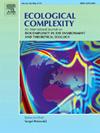Effect of current global warming trends on temperature-sensitive tri-trophic interactions
IF 3.1
3区 环境科学与生态学
Q2 ECOLOGY
引用次数: 0
Abstract
Understanding the impact of current warming trends on trophic interactions in diverse ecosystems presents a formidable challenge. While theoretical studies have explored multi-trophic interactions across broad temperature gradients, applying these models to realistic ecological scenarios where ecosystems experience modest gradual change in mean temperature remains underexplored. We address this research gap by examining a dynamic tri-trophic (resource-consumer-predator) system, where all ecological rates are modelled as explicit functions of temperature. We focus on the system’s bistable behaviour, characterized by chaotic attractor sustaining oscillations of all trophic levels and periodic attractor in resource–consumer plane. Under warming conditions, the chaotic attractor transitions through a sequence of states, including chaos, transient chaos, chaos, and ultimately, loss of bistability, as temperature rises. These transitions occur within narrow temperature range aligned with recent warming trends and this pattern remains consistent over a wide range of species’ thermal sensitivity, suggesting a generic feature of tri-trophic system’s response to warming. However, the temperature thresholds associated with these transitions differ between temperate and tropical biomes, indicating spatial heterogeneity in ecosystem responses to warming. Our findings support the hypothesis that tropical regions are more vulnerable to warming, despite experiencing low increase in temperature. Finally, we demonstrate the utility of partial control method applied during transient chaos phase as a potential strategy for preventing predator population collapse. Overall, our findings offer novel insights into complex, nonlinear impacts of warming on ecological systems and provide theoretical basis for partial control method as a management tool to prevent extinction.
当前全球变暖趋势对温度敏感的三营养相互作用的影响
了解当前变暖趋势对不同生态系统营养相互作用的影响是一项艰巨的挑战。虽然理论研究已经探索了广泛温度梯度下的多营养相互作用,但将这些模型应用于生态系统经历平均温度适度渐进变化的现实生态情景仍未得到充分探索。我们通过研究一个动态的三营养(资源-消费者-捕食者)系统来解决这一研究空白,在这个系统中,所有的生态速率都被建模为温度的明确函数。我们关注系统的双稳态行为,其特征是所有营养水平的混沌吸引子持续振荡和资源消耗平面的周期性吸引子。在变暖条件下,随着温度的升高,混沌吸引子会经历一系列状态,包括混沌、瞬态混沌、混沌,并最终失去双稳性。这些转变发生在与近期变暖趋势一致的狭窄温度范围内,并且这种模式在物种的热敏感性范围内保持一致,这表明了三营养系统对变暖响应的一般特征。然而,与这些转变相关的温度阈值在温带和热带生物群系之间存在差异,表明生态系统对变暖的响应存在空间异质性。我们的发现支持了一个假设,即热带地区更容易受到变暖的影响,尽管气温的上升幅度很小。最后,我们证明了在瞬态混沌阶段应用部分控制方法作为防止捕食者种群崩溃的潜在策略的效用。总的来说,我们的研究结果为气候变暖对生态系统的复杂、非线性影响提供了新的见解,并为部分控制方法作为防止物种灭绝的管理工具提供了理论依据。
本文章由计算机程序翻译,如有差异,请以英文原文为准。
求助全文
约1分钟内获得全文
求助全文
来源期刊

Ecological Complexity
环境科学-生态学
CiteScore
7.10
自引率
0.00%
发文量
24
审稿时长
3 months
期刊介绍:
Ecological Complexity is an international journal devoted to the publication of high quality, peer-reviewed articles on all aspects of biocomplexity in the environment, theoretical ecology, and special issues on topics of current interest. The scope of the journal is wide and interdisciplinary with an integrated and quantitative approach. The journal particularly encourages submission of papers that integrate natural and social processes at appropriately broad spatio-temporal scales.
Ecological Complexity will publish research into the following areas:
• All aspects of biocomplexity in the environment and theoretical ecology
• Ecosystems and biospheres as complex adaptive systems
• Self-organization of spatially extended ecosystems
• Emergent properties and structures of complex ecosystems
• Ecological pattern formation in space and time
• The role of biophysical constraints and evolutionary attractors on species assemblages
• Ecological scaling (scale invariance, scale covariance and across scale dynamics), allometry, and hierarchy theory
• Ecological topology and networks
• Studies towards an ecology of complex systems
• Complex systems approaches for the study of dynamic human-environment interactions
• Using knowledge of nonlinear phenomena to better guide policy development for adaptation strategies and mitigation to environmental change
• New tools and methods for studying ecological complexity
 求助内容:
求助内容: 应助结果提醒方式:
应助结果提醒方式:


